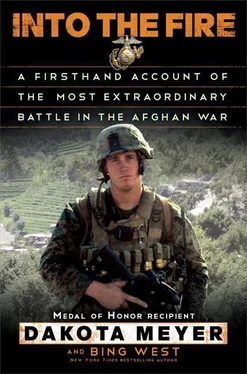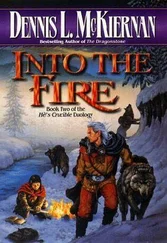Swenson was on his third combat tour and had held over a hundred key leader engagements with mountain clans. He popped up in the strangest places. Once, when Lt. Kerr was conducting a patrol into very remote valleys outside Dangam, his soldiers stopped by the compound of Gal Rahman, a border police chief. They were greeted by a lanky, beardless man in a gray man-dress and a flat pahkohl hat. It was Swenson. He had been invited to a wedding and had stayed on in the mountains for a week as the chief’s guest, despite the news that a “soft American target” had made its way back into Pakistan.
I was glad to see Swenson at the briefing. He was known for calling in artillery fire on the dot. Adjusting artillery in the mountains wasn’t easy. So I planned to introduce myself to Swenson and compare coordinates.
Fabayo said helicopters weren’t in support of us, but would be diverted if needed. He did say artillery was in support and pointed to the Kilo Echoes, or artillery registration points, marked by six red crosses on the photomap. I watched Swenson check them against his own map.
“Three-070 is the Undo KE, correct?” he said.
“Undo” meant we were pulling out. Swenson was concentrating on how we would get out of that box canyon if things went wrong. He wanted a fire mission to conceal our retreat. Maj. Williams believed 1-32 had assured him that “we could put smoke on the deck for screening.” KE 3070 was the registration point for that smoke screen.
“KE 3070 is the Undo,” Fabayo agreed.
The briefing hadn’t addressed command and control. I assumed Maj. Williams, as the senior American, was in charge. Battalion 1-32 believed Williams was in charge. But Williams believed Maj. Talib, the operations officer of the Afghan battalion, was in command. Which is the craziest thing I’ve ever heard in my entire life. Talib, who spoke broken English, could not call in fire support. But Talib and Williams would be together, so any confusion about command could be resolved on the spot. If everything went according to plan, the trip to Ganjigal would be a pleasant morning hike on a pleasant fall day.
At one point, Maj. Williams said, “I hope we can be back at Joyce in time for lunch.”
* * *
As we left the briefing room, I didn’t get that chance to corner Capt. Swenson; 1st Sgt. Garza pulled me and Team Monti aside.
“Gunny Johnson is replacing Meyer on this op,” he said.
Gunny Johnson handled logistics on base, doing endless paperwork. He was competent, even-tempered, and obliging. If Team Monti needed gear, he found it and shipped it to us. It was not unusual to rotate men on missions where low-level shooting was likely. Hearing a few rounds crack by once during a nine-month tour wasn’t too much to ask. Every Marine wanted to qualify for the Combat Action Ribbon. It would suck to be stuck on Joyce, and never qualify for the CAR.
Plus, I wasn’t popular at ETT headquarters on Joyce. Fabayo had told me several times that “our job as advisors was not to fight.” Headquarters considered me too headstrong. Maybe so, but on this patrol, we were going into a horseshoe-shaped valley with steep mountains on every side, with no trees or undergrowth for concealment, walking uphill for over a kilometer to reach two hamlets where every house was as hardened as a Normandy pillbox.
“I should be with my team, First Sergeant,” I said.
I was Team Monti’s tactician and gunner. In the dozen-odd scrapes we’d been in, I had burned through ten thousand rounds. I could clear misfires, coax malfunctioning breeches, and quickly swap out one barrel or one gun for another. I had walked fire onto targets at ranges from two hundred to seven hundred meters. On this patrol, I wanted to walk point in front of Lt. Johnson, not babysit the trucks in the rear. The four of us were a unit now.
Staff Sgt. Kenefick and Lt. Johnson agreed with me, objecting strenuously.
“We need Meyer,” Staff Sgt. Kenefick said.
“We’re a team, First Sergeant,” Lt. Johnson said. “It makes no sense to split us up.”
“The decision’s been made,” 1st Sgt. Garza said. “End of discussion.”
I tried to keep calm. I couldn’t be mad at Garza, as he wasn’t the one who had made the decision. I told myself it was my ego that was hurt. I was just steamed because I’d miss some shooting time. It was no big deal; the insurgents never fought from inside a village. Gunny Johnson deserved to go on a patrol. Still, why jerk me off the team? The ETT head shed at Joyce had pulled me out to shove my nose into it, to make me more of a team player, that sort of thing.
The more I stewed, the more upset I became. The mission brief hadn’t been thorough. The ridges around Ganjigal bothered the hell out of me. I couldn’t shake a bad, bad feeling.
I sought out Staff Sgt. Juan Rodriguez-Chavez, our motor transport chief. I had known him for five months. He didn’t stand on rank and we’d traded stories about growing up on farms. He had grown up on a ranch in Mexico. Having a similar approach to life, Rod and I had become friends.
He was in the eighth grade when his family moved to Texas, where he learned English, played football, earned good grades, and roped cows in rodeos. Our team called him “Hot Rod.” He laughed a lot, bragged about how smart his two daughters were, and kept all our vehicles in top condition.
“Rod, this mission is fucked up. If the shit hits the fan,” I said, “we’re going in. My team’s walking point, and they’ll get cut off. We have to go in and get them out.”
“Dakota,” Rod said, “don’t put this on Gunny Johnson. I heard him and Staff Sgt. Kenefick talking. They’re both upset you’re not with them.”
“I know, Gunny’s a good guy. I’m pissed about the whole setup. If they step in shit, they’ll need heavy firepower, and we’re back here. We have to be ready to push up that wash.”
“Devil Dog,” Rod said, “say the word, and I’ll do the driving.”
Having some sort of contingency plan now, I walked back to the advisor headquarters and briefed Lt. Johnson.
“If things get hairy,” I said, “I’m coming in. Rod will drive. Radio your coordinates and get down to the wash. Fucking climb in and we’ll haul ass back to the main body.”
He stared at me for a second, smiled, and burst out laughing.
“Meyer, you’re always thinking how to get into it,” he said.
He definitely was relieved. I did the fire planning for our team and then I was suddenly gone. Now I was promising I’d figured out a way to be there. The lieutenant was too good a leader ever to speak badly about anyone. He’d joke around about personality tics, but not in a way that undercut anyone’s authority. Still, he didn’t try to talk me out of it, or tell me to coordinate with Maj. Williams or Lt. Fabayo. My deal with Rod stayed inside Team Monti, and I took that as a green light. If there was trouble, Rod and I were going in.
The lieutenant and I lay down on the two couches in the advisor’s office. I could tell he was feeling better about the patrol because he wasn’t brooding or going over his notes. Instead, we talked and laughed about silly stuff. Maybe we had made too much fuss about another KLE.
While we were chatting, Fabayo, dressed in flip-flops, shorts, and a T-shirt, walked into 1-32’s tactical operations center to drop off our roster, called an equipment density list. Before a convoy leaves a base, all Social Security numbers and blood types are handed in to the duty officer.
In the TOC, a report about Ganjigal had come in via the brigade Internet. A Special Forces team reported that thirty-two fighters were moving from Pakistan to reinforce Ganjigal. Half an hour later, the video feed from an unmanned aerial vehicle showed a man with a mortar tube on his back entering a known safe house, two kilometers north of Ganjigal village. Ten minutes later, four more men entered the same house.
Читать дальше












